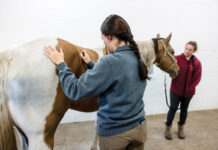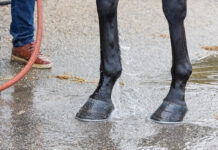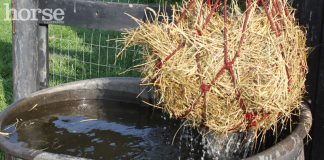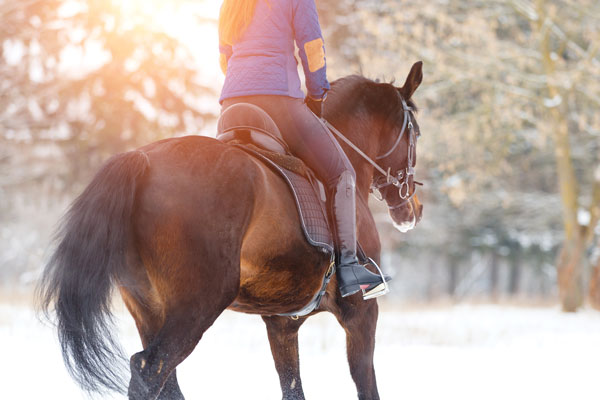
The weather outside might be frightful, but that doesn’t mean you can’t try your best to make the winter season delightful for your senior horse. Here are some tips for senior horse care in winter to help your older equine keep weight on and stay comfortable into the new year.
Weight Woes
First: teeth. As a horse ages, his molars wear down through constant grinding during grazing. These large, flat teeth that lie far back along his cheeks can begin to wear unevenly over the years, creating sharp, painful points that cause sores on the tongue and inside of the cheek. Uneven wear can also cause jaw pain and inefficient chewing. Some older horses may even lose teeth, which creates gaps where clumps of food become stuck. All of these issues can prevent an older horse from consuming enough calories to maintain his body weight.
 The second most common reason older horses lose weight in the winter is their overall metabolism. As animals age, they lose muscle mass and their cellular systems slow down. This means it takes more energy to keep them warm when the temperature drops. If a horse needs more energy to stay warm, but can’t eat enough because his teeth hurt, you guessed it: this creates a perfect situation for weight loss.
The second most common reason older horses lose weight in the winter is their overall metabolism. As animals age, they lose muscle mass and their cellular systems slow down. This means it takes more energy to keep them warm when the temperature drops. If a horse needs more energy to stay warm, but can’t eat enough because his teeth hurt, you guessed it: this creates a perfect situation for weight loss.
The first step for senior horse care in winter to help keep his weight up during the cold is to make sure his teeth are in good condition. If your vet hasn’t already been out for a visit recently, ask her to conduct a dental exam on your horse. This will give her a chance to file down any sharp points that have formed and manage any other issues your horse’s mouth may have.
The Right Diet
Once the teeth are managed, the next step in senior horse care is ensuring a high-quality, healthy diet. Always be sure your senior horse has access to high-quality hay during the winter months.
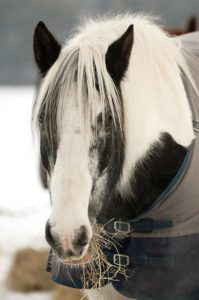
Most older equines should be allowed to eat as much forage as they want in the winter. The neat thing about forage is that the digestion of this highly fibrous material actually generates some heat in the horse’s gut—this acts like your horse’s own personal internal heating system!
Apart from forage, think about grain. If your senior horse currently eats some grain as part of his normal diet, one easy way to add calories is by top-dressing your horse’s feed with vegetable oil. Start small; just a quarter cup will do. If you add too much too soon, you’ll cause loose stool. After several days, gradually increase the oil to a third and then a half cup. After a few weeks, use a weight tape to measure and monitor your horse’s weight. Adding beet pulp is another way to add calories and bulk up his diet.
Ensuring he has a nice, warm blanket to snuggle in can also go a long way toward keeping weight on your older horse.
Before you make any changes to your horse’s diet, however, consider his overall health. If your horse has a medical condition such as Cushing’s disease, metabolic syndrome, or is prone to laminitis, talk with your veterinarian before making any changes. Increasing sugars or other nutrients by changing his diet may harm a horse with these specific conditions, so it’s best to check first before trying something new.
Aches and Pains
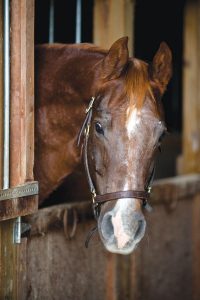
Cold weather can make anyone stiff, but add in age and painful joints due to osteoarthritis and it can be really hard for an older horse to get moving on a cold morning. You may notice your horse is slow to walk out of his stall or is stiff under saddle for the first several minutes during winter rides.
If possible, keep your horse turned out as much as possible. While this might sound like the opposite of what you should do—who wouldn’t want to stay cozy in a deeply bedded stall?—the more a horse moves, the more lubricated his joints remain and the less stiff he is overall.
When riding an older horse in the winter, allow extra time for a slow, gradual warmup to let those stiff joints loosen and the muscles to warm up. If you ride outside, be aware of the hardness of the ground; in cold weather, frozen ground can be especially jarring on stiff joints.
It’s commonly understood that an arthritic horse will warm out of his stiffness during work. This means the more he moves, the looser and more fluid his movement becomes. However, if you notice your horse not improving during a ride, or his stiffness or mild lameness gets worse, stop exercising and take a closer look.
If you have a lameness concern, or if you think the arthritis is getting worse, talk to your veterinarian. Rest, medication, or therapy, such as shockwave treatment, may be warranted, depending on the diagnosis.
Winter doesn’t have to mean weary weather. With some planning, your senior equine can weather this weather like a pro.
This article about senior horse care in winter appeared in the Winter 2021 issue of Young Rider magazine. Click here to subscribe!

